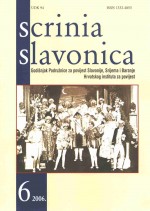Stjepan Vukovac – osječki gradonačelnik u vladi Nezavisne države Hrvatske 1941. godine
Stjepan Vukovac – Osijek’s mayor in the government of the Independent State of Croatia
Author(s): Davor KovačićSubject(s): History
Published by: Hrvatski institut za povijest
Keywords: Stjepan Vukovac; Osijek; Independent State of Croatia (NDH); Ministry of the Interior.
Summary/Abstract: There have been few records in Croatian historiography of Stjepan Vukovac, the Mayor of Osijek and Assistant Minister of Interior Affairs of the Independent State of Croatia (a position which very soon he abandoned). This paper sets out to illuminate, on the basis of historiographic data, the role and activities of Stjepan Vukovac, the mayor of Osijek at the time of the establishment of the Independent State of Croatia in April 1941. Special attention is paid to his entrance into and activities within the Government of the Independent State of Croatia, and to the reasons leading to his resignation in June 1941. On assuming the position of Assistant Minister of Interior Affairs, Stjepan Vukovac entered into conflict with Eugen Dido Kvaternik, and at this earliest stage of his mandate, voiced his disagreement with the current regime. As the state secretary and assistant minister, Vukovac told the ustasha official from Karlovac, Vladimir Židovac that “even though there have only been a few isolated cases so far, one must conclude that Dido Kvaternik and the other competent «figures» are preparing to wage a full scale war against the Serbs and the Jews to their complete annihilation”. Soon enough, Vukovac’s premonitions proved true; towards the end of June the most massive wave of arrests was launched. It must be stressed that the persecution of the Serbs, Jews but also of different-minded Croatians, produced a state of chaos in the Independent State of Croatia since its very inception. Persecutions of Serbs were a part of Pavelić’s planned agenda, which he started implementing aided by around 250 returned Ustashas. Such ustashas were sent off to different regions and places with the purpose of persecuting the Serbs and terrorizing the Croats who did not share their political views. Under the German pressure, some anti-Semitic laws were also passed and the persecution of Jews began. However, at lower administrative levels of the ustasha movement and the government there were quite a few officials who distanced themselves from the ruling regime and from their particular actions, and who resigned from their positions or cancelled their memberships. Among the higher structures of central government, such examples were few, but one notable example, beyond doubt, is Stjepan Vukovac.
Journal: Scrinia Slavonica
- Issue Year: 2006
- Issue No: 6
- Page Range: 448-468
- Page Count: 21
- Language: Croatian

